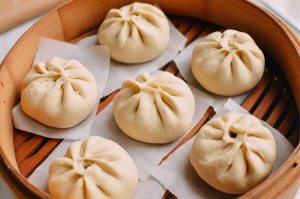
Mine are not as pretty as The Woks of Life’s. 😦
I pretty much don’t leave my house for shopping (or anything) unless my family is on the brink of starvation. There was some scheduling weirdness a couple weeks ago and I missed a shopping day and so, almost the entire week after, we were subsisting on a rotation of five core ingredients: brown rice, beans, frozen vegetables, lettuce, and eggs. I mean, I had kitchen staples like flour and ketchup, but still- things had the potential to get pretty tiresome. But man oh man have I got a well-stocked spice cabinet and a vivid imagination.
Chunky vegan taco bowls. Vietnamese rice soup. Cobb salad (sort of). Stir-fried vegetables with steamed buns (accompanied by many an exclaimed, “Did she really make fresh bao? Quaint!”). All things considered, we ate pretty well! My hubby and I chatted about how there’s probably this food spectrum that 90% of foods can fall on, and it actually kind of seems to hold up- how chicken soup is very similar to chicken stew, which is very similar to chicken and dumplings, which is very similar to chicken pot pie, which is very similar to pork pot pie, which is et cetera pretty much forever, with each item just slightly different than the ones around it, but different enough to be new and interesting.
Turns out, writing can be a lot like that too.
At their most basic, tropes are commonly recurring literary devices in creative works. They usually work outside of the literal meaning of a word or phrase to convey some deeper meaning, at there are lots of kinds of them. Closely related to clichés, tropes are sometimes looked down on, but if done well, they’re not necessarily bad. In fact, you’d be hard pressed to find any piece of fiction that didn’t use tropes.
The tropes I’m specifically thinking about today are the kinds that I like to spoof in my Trope Fail comics. Not necessarily irony or metaphor, but the plot conventions and devices that tend to creep into more stories than not given a certain genre. These are more like ‘YA cannot communicate’ or ‘the evil twin’ or ‘the butler did it’ sort of tropes, and are closely related to archetypes (as proposed by Jung), such as the Magician or the Hero.
(Side note: You can take this archetype thing even wider. Some suggest that all stories can be distilled into just a few story archetypes. Author Christopher Booker claims there are just seven, and he makes an argument for it in his book The Seven Basic Plots: Why We Tell Stories.)
Some people complain that this prevalence of tropes makes it so that nothing is new anymore- all stories have already been told in one form or another. And maybe in a way, they’re right, just like I didn’t serve anything but beans and rice and veggies to my family all week. But I would argue- and hopefully they would too- that I wasn’t serving the same thing each night, just as new books aren’t rewriting the same seven novels over and over again.
Romeo and Juliet has been retold hundreds of times over the centuries- and was itself a retelling too. Does that make West Side Story just the same old hash? Is Warm Bodies just another repeat? (And how about Daughter of Smoke and Bone? I haven’t read that one yet but I’ve heard it’s R&J too. Those crazy kids are everywhere.)
It’s the spices that makes the difference. The preparation. The minutiae. Star-crossed lovers are nothing new. Heck, they weren’t new in the 1500s (although arguably, marrying for love was). But that same theme looks very different when talking about wealthy Italian kids, or hardscrabble street gangs, or zombies. And this is just scratching the surface. I mean, look at Ryan North’s Romeo and/or Juliet! Things get crazy!
Each author brings something new to the potluck in their treatment of the same tropes. Maybe you think you shouldn’t write that Paleolithic stonepunk thriller ‘cause you’ve already seen a dozen. Maybe you’re worried that your cybernetic mermaids have been done a thousand times. Maybe you don’t think you have anything new to add to the Sherlockian eco-fantasy scene.
Write it anyway- or paint it or record it or whatever. Create. Prepare it in your own special way and make it new. It isn’t our bones that make us who we are. If you have a story that you love rattling around in your head, but you aren’t sure it’s fresh enough, write it anyway. It may surprise you what you can do with just a handful of boring old ingredients and a full spice cabinet at your disposal.
Happy writing!
